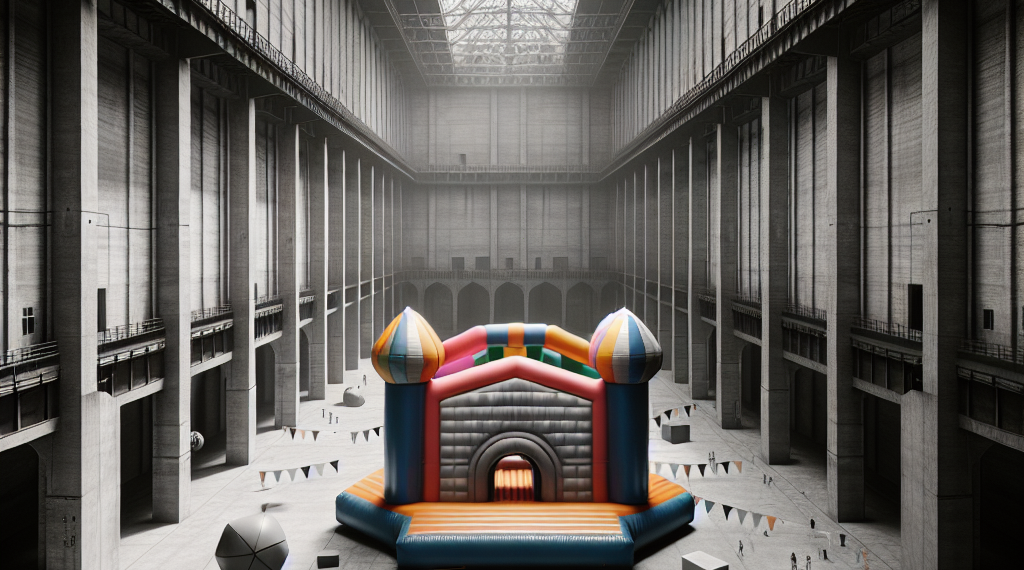The Enchanted Garden That Never Bloomed and Glasgow’s Ill-Fated Fantasy Event
Glasgow’s anticipation for an event that promised to whisk them away to a whimsical, chocolate-coated realm akin to Willy Wonka’s world was palpable. The House of Illuminati, with its evocatively enigmatic name, hinted at an immersive experience that would transport attendees into a place of pure imagination. Yet, the reality presented was starkly different, as the supposed enchanted garden was more akin to a mirage amidst a desert. Instead of finding themselves surrounded by the fantastical delights of a candy-laden paradise, visitors were met with the sobering disappointment of an industrial space adorned with a sparse scattering of decorations. An inflatable castle stood in the center, its whimsy undercut by the austere environment, serving as a symbol of the contrast between the dream sold to them and the reality they encountered.
It wasn’t supposed to be like this. The event, unaffiliated with the official Wonka franchise, teased the creation of an extraordinary world, replete with all the chocolatey adventure one could dream of. Organizers had spun tales of a chocolate fantasy made real, a place where indulgence and playfulness would reign supreme. Yet, the reality was a far cry from the fantasy, with AI-generated backdrops serving as a poor substitute for the rich imagery of Wonka’s garden. These digital projections, rather than enhancing the atmosphere, only highlighted the chasm between the promised wonderland and the underwhelming setup. And as if to add insult to injury, character representation was limited to a single “Wonkidoodle” amidst the absence of the expected Oompa Loompas. It’s a classic case of expectations versus reality, where the latter was a pale imitation that left a lot wanting. The illusion of a chocolatey adventure was, unfortunately, just that—an illusion, as tangible as the ephemeral scent of candy in the air.
When Magic Fades to Disillusion and Inside the Wonka Experience Gone Wrong
The dream of a magical experience was quickly dispelled as attendees were greeted by a scene that seemed antithetical to the vibrant factory depicted in Roald Dahl’s imagination. Upon entering, families and fans were met with a harsh, unadorned warehouse space, its cavernous interior echoing with the sounds of disappointment rather than the jubilant music of Wonka’s world. The promised delights — from the singing Oompa Loompas to the fantastical machinery churning out confectionery wonders — were conspicuously absent, replaced by a singular AI-generated backdrop that poorly mimicked the narrative’s heart. This digital display, rather than serving as a portal into Dahl’s universe, stood as a stark reminder of what could have been but wasn’t.
The event’s lone character, the so-called Wonkidoodle, was the only nod to the quirky staff of Wonka’s factory, but even this was executed in a manner that could only be described as half-hearted. The shortfall in character representation was not merely a logistical oversight; it symbolized a broader issue of unmet promises and expectations. The promised chocolate river was nowhere to be found; instead, attendees were promised more than they received, with one child reporting a paltry two jelly beans and a half cup of lemonade as their magical bounty. This was no small letdown; it was a grand disillusionment for those who had come expecting the whimsical escapism that Charlie Bucket himself had once journeyed through. The event failed to capture the essence of Wonka’s factory, and in doing so, it shattered the illusion of a chocolatey escapade.
A Single Wonkidoodle Vs. A Warehouse of Disappointment
The event’s very integrity hinged on the strength of its character representations, which were disappointingly meager. Amidst the outcry, it’s important to highlight the plight of the employees, who seemed just as misled as the attendees. The workers, adorned in attire that fell short of the magical standard set by the Wonka narrative, found themselves in the unenviable position of representing an event that had already started to unravel at the seams. This misstep not only affected the guest experience but also reflected a deeper issue of inadequate preparation and support for the staff. Many of them expressed doubts about their payment, having been wrapped into the chaotic aftermath of an event that would never live up to its billing. Instead of the intricate and iconic costumes one would expect in a Wonka-inspired event, workers donned inadequate and seemingly hastily provided attire. It was a cheapening of the beloved Oompa Loompa image—a disservice to the fictional workers known for their unique charm and integral role in the Wonka universe.
Ticket Turmoil and Outrage Over the Cost of Unfulfilled Promises
The financial impact on the families was significant, given the cost to enter what was billed as a fantasy extravaganza. With tickets ranging up to £35, families shelled out their hard-earned money only to have their expectations shattered. The value promised seemed to be a figment of the organizer’s imagination, leaving families not just financially out of pocket but also emotionally deflated. As the event’s reputation nosedived, ticket prices plummeted to £18, and the title was sneakily changed from “Willy Wonka’s Chocolate Factory Experience” to “Willy’s Chocolate Experience”, as if a simple rebranding could somehow salvage the experience. It couldn’t. To the dismay of many, the event was abruptly canceled midway, leaving some ticket holders in the lurch, unaware of the cancellation until their arrival. This sudden cancellation added insult to injury, as many attendees found themselves not only deprived of a magical experience but also of the opportunity to even step through the doors.
The House of Illuminati Meltdown and Apologies, Refunds, and Deleted Regrets
In the aftermath, the House of Illuminati, and its founder Billy Coull, issued an apology and promised refunds. Yet, in a move that further eroded public trust, the apology was later scrubbed from their Facebook page—a digital erasure that did little to assuage the anger and frustration of those involved. This apparent attempt to backtrack or mitigate the fallout only compounded the sense of betrayal felt by the event’s participants. Social media, a platform where reputation is as fragile as it is fleeting, became the forum for public outcry and disbelief. For an organization established as recently as November 2023 and a director known for using AI to craft novels, this foray into reality was a stark lesson that the human element in entertainment cannot be so easily replicated or replaced.
The rise and fall of the House of Illuminati’s endeavor into a Wonka-esque world stands as a modern parable. It serves as a cautionary tale of not just the importance of fulfilling promises but also the necessity of ensuring that ambitious visions are grounded in practical reality. This event was a fiasco with a lasting aftertaste, one of disillusionment and a stark reminder that when magic fades, the bitterness of reality can be a tough pill to swallow. For the many families who looked forward to a delightful adventure, all that’s left are lessons learned and hopes that future events learn from the mistakes of the House of Illuminati’s fantasy gone awry.










